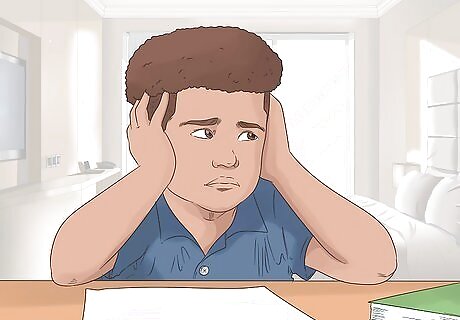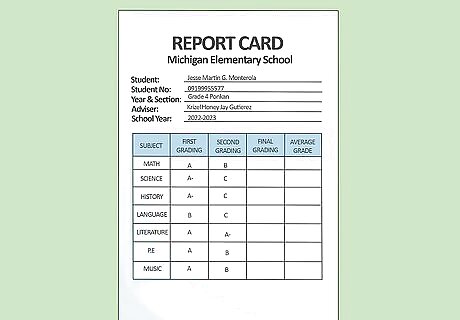
views
X
Research source
This burnout can come with lifelong implications if it isn't resolved, but fortunately, with some time and effort, it is very well possible to overcome this issue.
Identifying Gifted Kid Burnout

Identify any negative connotations you have about attending school or other academic-related activities. Many educational institutes do not provide the appropriate resources necessary for a gifted child to accelerate. As a result, the student feels they are not properly supported and can become burnt out easily in this unideal environment. If you feel a sense of dread about going to school, it could be a sign that you're experiencing gifted kid burnout.

Assess whether or not you experience difficulty when it comes to studying and time management. Being a gifted child means that you're born with more natural intellect than most people. In your early years of schooling, you may have noticed you excelled at the given work in comparison to your peers. As a gifted student progresses into higher education or later stages of life, they may find it hard to study because they've never had to before.

Notice changes in your academic results. If you are achieving significantly less than what you're used to, it could be attributed to exhaustion or a loss of motivation due to burnout.

Identify any feelings of hopelessness you have in regard to your academics.

Recognize any symptoms of depression. It's common for gifted children to have mental health repercussions due to the immense pressure and expectations placed upon them. Some gifted children can be more prone to depression due to increased sensitivity, constantly striving for perfection, and feelings of being excluded from their peers. Signs of depression in gifted children often includes: An inability to respond well to criticism Negative self-talk Becoming easily upset at academic results Low self-esteem Long periods of unhappiness

Take note of changes in sleeping patterns. Studies have shown that people experiencing burnout are much more likely to undergo insomnia and sleep fragmentation than people without burnout. If you find yourself in need of more (or less) sleep than usual, you're likely experiencing the effects of gifted kid burnout. Burnout can also cause you to sleep at different times of the day than you would normally, so look out for that too.

Take note of changes in appetite. Those suffering from burnout will often find they eat a lot less or a lot more than they would normally. This change in eating habits can be attributed to excessive amounts of stress and over-exhaustion that accompany gifted kid burnout. If you catch yourself skipping meals and losing significant amounts of weight, or uncontrollably eating, it could mean that you're feeling burnt out. Your body automatically puts itself in "fight or flight" mode when you're overworked and stressed. Stress produces a hormone known as cortisol. This increase in cortisol triggers a response from your brain that suppresses your digestive system to combat the effect of the cortisol. In turn, your stomach stops breaking down food and as a result, you no longer feel hungry easily. However, in the long term, too much cortisol in your system can increase stomach acids which speed up digestion, making you feel hungry all the time and lead to you binge-eat. If you find yourself losing or gaining too much weight due to burnout, it can lead to significant health risks, so consult a physician if you think it may be a problem.Tip: If you find it hard to track your eating habits, you can use a diet app or try keeping a food diary!

Assess whether or not you are withdrawing yourself from your family and friends. Gifted kids affected by burnout may want to isolate themselves in response to feeling overwhelmed. Burnout causes both physical and emotional exhaustion, which makes social interaction difficult in this state. Think about whether you've been turning down your friends recently, or if socializing with others has been more tiring than usual.

Determine whether or not you could be suffering from gifted kid burnout using the steps listed above. If a number of the signs mentioned in this article apply to you, it's likely you're experiencing gifted kid burnout. If so, don't panic! Many people labelled as gifted at a young age go through the same thing, so you're not alone. Read on for tips on how to combat this issue.
Overcoming Gifted Kid Burnout

Replace a fixed mindset with a growth mindset. Someone with a growth mindset believes that their natural intellect is something that can be developed through hard work rather than a fixed trait that they're born with (those who believe the latter have what is known as a fixed mindset). Changing your mindset can pose as a challenge, especially if you've been living with a fixed mindset for a number of years. Some key steps you can take to change your mindset include: Learning to accept failure Seeking validation from yourself rather than others Remaining open to constructive criticism Practicing persistence and not giving up Being realistic about what you can achieve in a period of time

Understand that effort matters just as much as natural intellect. Many gifted children grow up without having to try very hard in order to achieve the marks other kids have to study very hard to earn due to being naturally smarter. While this is certainly nice at the time, in the long term, this means that those gifted kids aren't able to develop the study skills and persistent work ethic they need later on in high school, university/college and in their careers. If you find it difficult to motivate yourself to complete any work, it could be that you believe that you can make it on your natural intellect alone and trying hard isn't required for success. If so, do your best to change this belief - because it's not true. While your natural intellect definitely gives you a head start compared to other people, if everyone else is working really hard and you're relying purely on your talent, they're sure to catch up or even overtake you eventually. Tip: Think of it this way - even if you're starting a few steps ahead of everyone else in a race, you're bound to fall behind if you're walking and all the others are running.

Find coping methods that work for you. When it comes to stress, it's helpful to have a trusty coping mechanism that you can turn to when you need to take a breather and reset. Everyone deals with struggles differently, so experiment with different ways of coping until you find one that's right for you and makes you feel good. It doesn't matter what it is, as long as it helps you destress! Some popular stress relieving activities include: Engaging in a mindfulness meditation Writing in a gratitude journal Completing a yoga session Taking a walk around your neighbourhood Playing a musical instrument Tip: You can do these activities with friends or family if you find it more enjoyable.

Link your personal values and ethics to your work. Many gifted children have strong senses of justice. If you can relate, try to make connections between your school work and the real-world. This will give your work a newfound sense of meaningfulness which can help to motivate you. It's easy to become burnt out if you believe all the work you're doing is pointless. Try to see how the things you're doing now is beneficial in the long run - because it probably is! Even tasks that are incredibly boring usually have a purpose - find it and focus on it.

Express your emotions. Gifted kids with burnout often experience depression and anxiety. While it can be daunting to open up to someone and tell them how you're feeling, it can feel good to get everything off your chest once in a while. Talking to someone you trust about your worries and concerns can be a major relief.

Come up with a flexible study routine. Plan each day out roughly, allotting time for both study and plenty of breaks. This will help you to study more effectively without overworking yourself. Don't worry if you don't stick to your original plan exactly. The most important thing is to not exhaust yourself!

Adopt non-academic hobbies and interests. Finding an activity you enjoy outside of school and anything school related is immensely beneficial for counteracting gifted kid burnout and improving mental health in general. A hobby provides an outlet for any pent-up stress and other negative effects you may experience as a burnt out student. After a busy day, unwind and reset by turning your mind to something you love!

Consider consulting a counsellor.




















Comments
0 comment